












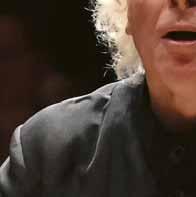
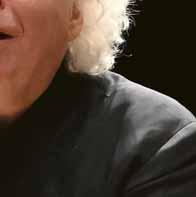


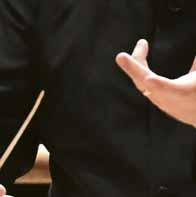









CELEBRATING 140 YEARS OF THE ISM
AUTUMN AUTU 2023
ISM
Campaigning
Kadiatu Kanneh-Mason
Farewell to Simon Rattle






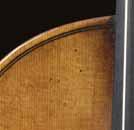


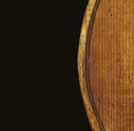


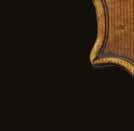
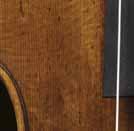



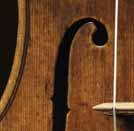

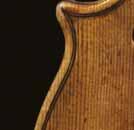
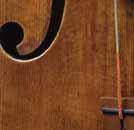


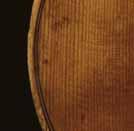




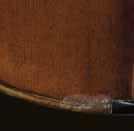

ISM members get a 20% discount on their musical instrument insurance with Lark Music To qualify for the discount, use your exclusive promotion code ISM10 either when calling our team on 020 3846 5271 or submitting your details via www.larkmusic.com/ism ‘A really excellent operation here’ “Lark Music are a thoroughly professional operation who really understand the needs of musicians. Great staff and great attitude”. Lark Music is a trading name of Aston Lark Limited. Registered office: One Creechurch Place, London, EC3A 5AF. Registered in England and Wales, No. 02831010. Aston Lark Limited is authorised and regulated by the Financial Conduct Authority, No. 307663. AL-CS-LM-093-0823 For the love of music. • A personal and expert team with in-depth knowledge of the musical world • Cover for core risks such as fire, flood, loss, theft and accidental damage • Reimbursement for any loss of value in the event of a claim • No admin charges for policy changes and a 14-day cooling off period • Claims paid in cash, quickly • Temporary cover for instruments on loan worth up to £50,000 for up to 60 days for free • The option to add on Unattended Vehicle Cover and Climatic Conditions Cover
Music Journal which is packed full of news and features, from saying goodbye to Sir Simon Rattle, to a great feature on the soundfestival in Aberdeen, with which our President Pauline Black is closely involved.
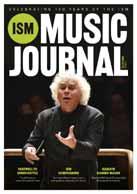
We also take a look at the discounts which you can get as a member of the ISM – read Francesca Stokes’ feature on page 6. Francesca has recently joined us as the Head of Member Engagement so if you have any queries about any of the services and discounts we provide to members, or any aspect of your membership, please get in touch with her at Francesca.Stokes@ism.org
Music Journal also features two of our very long-standing campaigns Save our Subjects campaign which has been led by Naomi McCarthy at the ISM. As many of you will recall we have been calling for a review of the accountability measures which have done so much damage to music and other arts subjects in our schools. From the response
through. Read more on page 4.
And then of course there is the ongoing damage being caused by Brexit on UK musicians and the support staff who want to perform in Europe. Read all about our sixth Brexit report on page 13 which exit from the European Union. It is an incredibly important piece of work and demonstrates that despite the ISM and others putting forward solutions which would ‘make Brexit work’ for musicians, the government has failed to listen. Please do promote the research and the recommendations via all your networks so that we can make change happen.
Many of you will be renewing your membership over the next few months. In the current climate we have done everything we can to keep the increase to a minimum, and for students we have managed to ensure there is no increase at all – surely the best value for money going. If you are a full or early career-grade member, there will be only a £3 or less increase to your annual membership subscription.
With the range of services we provide, from free in-house legal services and an out-of-hours helpline to our comprehensive range of insurances including public liability insurance and legal expenses insurance; from professional development and a wide range of renew your membership and remain part of the ISM community.
04. News & Campaigns
06. ISM Member Discounts

08.Safeguarding for musicians
10. ISM to publish new Advocacy Guide

12. The Music Education Hub Investment Programme
13. Paying the price: The ISM publishes its sixth Brexit Report
16. Meet ISM’s new Distinguished Musician
18. Farewell to Simon Rattle
22.Soundfestival
26. Future directions for the ABRSM
30.Man on a mission: Norton York and the RSL Awards
32.ISM Community
36.Member Spotlight
Contents
Volume 90 / Number 2 E. deborah@ism.org
WELCOME
Photo: Emile Holba
Welcome
The #SaveOurSubjects campaign handed in an open letter signed by over 1,150 individuals to the Department for Education on 19 July.
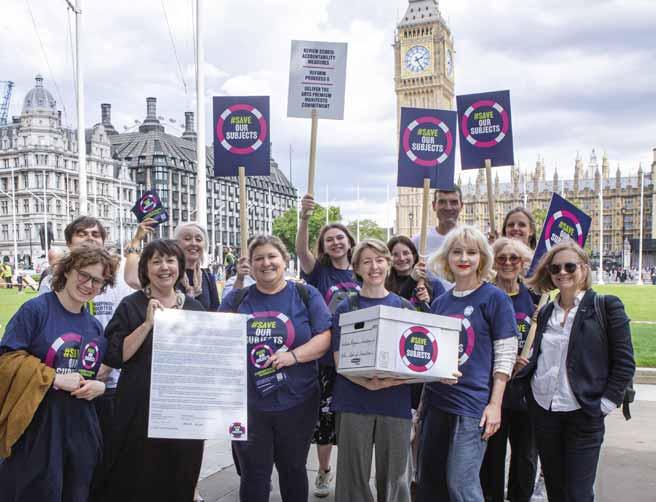
The campaign was formed by the ISM and Edge Foundation to raise awareness of the dramatic fall in music and other arts GCSE entries, which have dropped by over 40% since 2010. The letter calls on Education Secretary Gillian Keegan to:
• review the impact of accountability measures on arts and technology subjects
• reform Progress 8, giving pupils more freedom of choice at GCSE
• deliver the Arts Premium promised in the Conservatives’ 2019 election manifesto
Signatories of the letter include the ISM’s president and board members Pauline Black, Vick Bain, Kirsty Devaney, Jeremy Huw Williams, Rhiannon Mathias and Nicky Spence plus the heads of a wide range of arts and education organisations.
accountability measure which is used for school league tables and is heavily weighted towards EBacc subjects. The EBacc excludes all art and technology subjects.
The letter hand-in came as the Labour party to ensure students can ‘enjoy music, sport, art, drama, and develop the knowledge and skills they need to thrive throughout life.’
ISM Chief Executive Deborah Annetts said, ‘The rate at which arts subjects are disappearing from our schools is both staggering and frightening. The support for our letter to Gillian Keegan clearly demonstrates the level of concern.’
O letter
4
Provisional entries for summer 2023 GCSEs predict another sharp fall in music.
exam boards, show that compared with 2022 entries, music
16.4%, drama by 7.4%, and art and design subjects by 3.3%. This is despite an increase in the overall size of the cohort. trend that has seen non-EBacc subjects decline steadily since 2010.
The APPG for Music Education discusses hubs
The ISM hosted the latest meeting of the All-Party Parliamentary Group (APPG) for Music Education on 18 July.

Chaired by Wera Hobhouse MP, the meeting heard from guest speakers Veronica Wadley, Baroness Fleet, who chaired the expert panel which informed the refreshed National Plan for Music Education; Stuart Whatmore, Head of Tri-borough Music Hub; and Dr Adam Whittaker, Head of Pedagogy at the Royal Birmingham Conservatoire.
The meeting focused on the future of music education hubs, which are currently undergoing a restructure that will see their number cut by over 50%. The ISM is concerned that the government has not made the case for how the restructure, which involves hubs in a huge amount of administrative work,
Minutes of the meeting are available on the APPG website: musiceducationappg.org
Arts subjects are also predicted to fall at A-Level: music by Annetts said, ‘This is yet another set and arts subjects in secondary schools. Government must urgently take action to support these subjects before they disappear from the curriculum.’
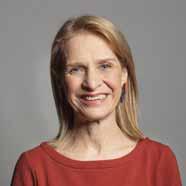
For analysis of the actual GCSE results published on 24
Committee
Schools Minister Nick Gibb has been told by the Lords’ 11-16 Education Committee that he is alone in defending the English Baccalaureate (EBacc).
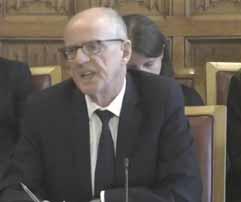
Gibb, who appeared in an oral evidence session on 13 July, defended his decision to exclude music and other subjects from the EBacc. He was informed by former Conservative education secretary Lord Baker: ‘You should be aware that 95% of the evidence we have received in this committee, both written and oral, has come to the conclusion that Progress 8, the eight reports, all of which you rejected, in the last year.’
When questioned by Lord Storey about the role of the EBacc in the decline in creative subjects, Gibb replied: ‘I do not accept the premise of the argument.’
GCSE subject grouping Entries summer 22 Entries summer 23 Percentage change Art and design subjects 194,040 -3.3% Drama53,790 -7.4% Music34,13030,115 expressive arts -16.4%
August,
ism.org/news
see
Left: Wera Hobhouse
AUTUMN 2023 NEWS & CAMPAIGNS 5
Photo: David Woolfall
ISM Member Discounts
As utility bills continue to rocket, here at the ISM we want to help alleviate some of that


range of discounts located within two designated support packages, tailored to suit both your professional and everyday needs.

One discount package focuses services, designed to lessen work-related costs; the other is Discount Plus, which is there to assist you with your everyday spending, so you can save money on anything from food deal on a new phone contract or a weekend away.
Popular food shops that regularly feature across the platform are M&S, Tesco, Sainsbury’s, Asda, Aldi and Morrisons, and their discounts tend to be around 5%. Tesco has been our highest redeemed discount to date and has been closely followed by Sainsbury’s, Morrisons and M&S.

Once you select the discount you follow the checkout instructions, and your discount will be applied automatically. Check your email inbox for your e-gift and follow the link on the email to access your e-gift.
The Discount Plus service is a platform of varied lifestyle discounts and is updated on a weekly basis, so you will never tire of the choices. In addition, there are often prize draws and competitions available which, although not funded by the ISM, are open to ISM members.
as discounts on dining out, reduced prices on theatre tickets and events, and if you are looking to update your laptop or mobile phone there are plenty of weekly technology offers available.
The Discount Plus page needs to be opted into and you will be required to complete an online form, so we can allocate you an account. Once you have successfully created an account, you will have unlimited access to browse at your convenience. Members regularly comment on the savings they’ve made by using Discount Plus, and if you activate your account today, you can start saving immediately.
Our other ISM discounts separate from Discount Plus, are tailored to the needs of those who work in music. Discounts range from insurance to promotional services, recording studios and rehearsal spaces and magazine and book subscriptions, and there are many more.

‘We don’t want our members to limit their career progression, so we have worked hard to partner with companies that support ISM members and, like us, want to help members retain their access to these services’
Francesca Stokes, ISM’s Head of Member
becoming an ISM member 6
of Member ISM MUSIC JOURNAL
For musicians, these services and resources are often fundamental to their career, and without a discount they can career progression, so we have worked hard to partner with companies that support ISM members and, like us, want to help members retain their access to these services.

The ISM discounts are all readily accessible from our website at ism.org/membership/full-membershipIf you click into the favoured discount, you will see a brief description of the discount and then you will be directed to the associated website to access the advertised deal.














If you experience any issues with accessing the discounts or you would like advice on claiming them, please call the Membership team on 0203 7221 3499 or email us at membership@ism.org and we’ll be happy to advise




we want to help alleviate some of your financial burden by offering an expansive range of discounts.
AUTUMN 2023 ISM MEMBER DISCOUNTS 7
D E V E L O P M E N T
Safeguarding for musicians
family or an institutional or community setting. It can be perpetrated by someone who is known to the person, or more rarely by others, and can take place online.
We are all responsible for the safeguarding of children and vulnerable adults. The ISM takes safeguarding seriously and we have policies in place to both guide members and deal with issues should they arise. All members should read the safeguarding policies and be aware of how to report matters as well as what will happen if an allegation is made. This feature will run through the basics of safeguarding, where you might get further information and what to do if a safeguarding issue arises.
For the purposes of safeguarding, a child vulnerable adult at its basic is anyone over the experiencing, or is at risk of, abuse or neglect and because of their care and support needs is unable to protect themselves.
Abuse can take different forms, and be in a
• Physical abuse: this can involve hitting, shaking or other behaviours which cause physical harm
• Emotional abuse: this can include shouting at or belittling a person as well as threatening to harm them
• Sexual abuse: this is where a person is forced or enticed to take part in sexual activity
• Neglect: this the persistent failure to meet a person’s basic physical or psychological needs such that it results in serious impairment to a person’s health.
It is important that you read any safeguarding policy provided by your place of work. Members who work in schools or with young people should also read and follow the guidance, such as Keeping Children Safe in Education, which is issued in England, Scotland, Wales and Northern Ireland.
If you have concerns about a child or vulnerable adult you must report them. If you are working in a school there will be a member of staff who is responsible for safeguarding and you must report anything to them. If you are working in a care or health setting then there will be a safeguarding lead. Other organisations may have safeguarding policies and you should


As a new academic year begins, the ISM’s Director of Legal Services, Stuart Darke, provides a reminder of your safeguarding responsibilities
PROFESSIONAL
8 ISM MUSIC JOURNAL
follow any reporting requirements. If you are working independently then you should contact the ISM Designated Safeguarding Person (DSP) for advice. Contact the 24-hour child protection helpline run by the NSPCC if the matter relates to a child; you can also contact the local authority children’s or adult’s social care department. If a child or vulnerable adult is in immediate danger, contact the police straight away. What is important, if you have concerns, is to report it as quickly as possible to get it into the hands of safeguarding professionals. Don’t conceal it and don’t think that someone else will report it.
If a safeguarding allegation is made against you then you should check the reporting procedures at any workplace and if necessary contact the safeguarding leads in those places. You should contact the ISM legal team without delay and they will be able to advise you. Our legal team will assist you, but under our own safeguarding procedures, the ISM DSP will have to be informed and action may be taken. This may result in a referral to the ISM
Additional information:
ism.org/about/safeguarding learning.nspcc.org.uk/safeguarding-child-protection
safeguarding-adults-board ism.org/advice/dbs-pvg-access-ni ism.org.safeguarding (ISM webinar)
Practical tips:
Get a criminal record check for yourself through the ISM if you don’t have one through an employer.
Physical contact
• check any workplace policy on contact and follow it
• contact is only appropriate in limited circumstances
• any contact should be stated in writing and agreed to
• never touch a pupil on the trunk of the body unless
Social media
• never befriend, follow, connect or communicate with children using social media
• avoid the use of email, text messages or telephone calls to communicate with children
• think carefully about online teaching and the safeguarding implications.
Grooming
• never give a child money or presents
• do not engage in inappropriate or unprofessional conversations with children or vulnerable adults
• do not do favours for a child such as giving them a lift home.
Teaching or working alone
• in a workplace make sure that it’s possible for another person to view the lesson or activity from outside the room
• if teaching at home, ask parents or guardians to sit in on lessons or to wait in an adjacent room with the door open
• always provide information about who else might be present.
ISM Trust webinar – Ofsted: Music in schools

Thursday 21 September, 4–5pm Register free of charge: ism.org/ofsted
HMI Christopher Stevens, Ofsted Subject Lead for music research review in this free ISM Trust webinar. He curriculum in England’s schools.
All members should read the safeguarding policies and be aware of how to report matters as well as what will happen if an allegation is made.
AUTUMN 2023 PROFESSIONAL DEVELOPMENT
to publish


Advocacy Guide
After delivering well-received conference sessions on advocacy for music and arts education and holding discussions with music teachers, the Arts in Schools toolkit to provide an advocacy guide which can be used by ISM members and the wider sector. In addition to our research reports and campaigning, this resource is another way in which we can help to make the case for more music in schools.
The ISM constantly advocates for music education to the government and politicians of all parties and is the secretariat of the All-Party Parliamentary Group (APPG) for music education, but everybody working in the sector can also play their part, particularly at a local level within their individual constituencies.
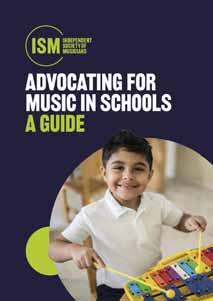
Teachers are incredibly busy and it can often be overwhelming to know where and how to start when it comes to advocating for your subject. We want to break down the steps and make advocacy as easy and effective as possible.
While it would be hard to imagine any headteacher who didn’t want their school to offer music, arts subjects are in serious decline in English schools. Curriculum decisions
There are undoubtedly excellent music teachers up and down the country doing fantastic things for their students, but we know from our own research and that of the Department for Education that provision is still very patchy. Some teachers are struggling to build the departments they want for their students, with small or zero budgets, and low uptake at Key Stages 4 and 5.
So, how can teachers go about advocating for their subject – to decision makers and budget holders such as those in Senior Leadership Teams, to governors holding those teams to account, to parents, to their colleagues and to pupils themselves? How do you get decision makers to appreciate the value of expenditure on music rather than simply thinking about the cost implications?

We want to break down the steps and make advocacy as easy and effective as possible.
ISM
The ISM has prepared a new guide on how you and your colleagues can make the best case for music and arts education. Jodie Underhill , Research Associate at the ISM, tells us more
ISM MUSIC JOURNAL 10
Our new publication, Advocating for music in schools: A guide explains what advocacy is in different contexts and the various reasons someone might have for advocating for music in schools. It draws on research showing the direct
local councillor or MP. It also suggests various forms of evidence that could help make the case for investing in music education.
It outlines who you might advocate to, including parents, senior leaders, governors as well as local and central government. And, it helps you decide what to advocate for – issues which are personal to you, your pupils and your school’s circumstances.
The advocacy guide contains a range of practical ideas and strategies to advocate for music in schools as well as a template letter and other guidance for writing to your

Although the guide is predominantly aimed at colleagues working in English schools, due to the particular issues that accountability measures raise, many of the ideas it contains are still applicable to Scotland, Wales and Northern Ireland. However, the ISM team are always happy to support members with tailored advice for these countries.
Advocating for music in schools: A guide is scheduled for publication in September and will be available free of charge as a downloadable resource from the ISM website. Print copies will also be available on request via membership@ism.org
It outlines who you might advocate to, including parents, senior leaders and governors, as well as local and central government. And, it helps you decide what to advocate for – issues which are personal to you, your pupils and your school’s circumstances
NEW ISM ADVOCACY GUIDE 11
The Music Education Hub Investment Programme
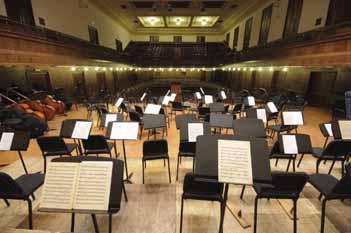
The ISM’s Head of External Affairs, Colin Stuart, provides an update on the forthcoming shake-up of music education hubs in England

The Music Education Hub process, which is being undertaken as part of the refreshed National Plan for Music Education The power of music to change lives, intends to see new music hubs across England in place for the beginning of September 2024.
The process will see the Department for Education and Arts Council England (ACE) reduce the current number of music hubs from 116 to 43, a 63% reduction. Those that wish to become a lead hub have until midday on Thursday 12 October to apply.

ACE has stated that it will announce the new lead hubs in April 2024. To date, the process has run largely to the advertised timeline.
The existing music hub structure was introduced as part of the original National Plan. Meaningful questions have been raised as to how the hub restructure will ultimately lead to increased high quality music education being provided to students. This has not yet been made clear.
Music hubs to be reduced from 116
43
63% reduction
While the refreshed National Plan did make many positive recommendations, many of which aligned with many years of campaigning by the ISM, it is a nonstatutory publication and reforming accountability measures such as
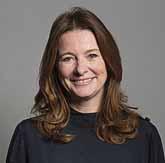
its scope. Therefore the impact of the plan always had the potential to be limited.
The decision to disrupt the current, established hub structure has led to concern amongst many of the existing hubs. Hubs have spent years establishing relationships and partnerships with schools, music establishments and more in their areas and there is a risk that these relationships and
Further, many ISM members work for or are regularly engaged by music hubs. Please remember that the inhouse ISM legal team is there to support members and give advice to those who require it.
Find out more about the hub investment process at:
Darren Henley, Chief Executive of Arts Council England
Gillian Keegan, Secretary of State for Education
Photo: David Woolfall
ISM MUSIC JOURNAL 12
Paying the price: the ISM publishes its six th Bre xit Report

Naomi McCarthy, ISM’s Senior
summarises our latest report on the impact of Brexit on the music industry

In August the ISM released its latest Brexit report, Paying the price, based on a wide-ranging survey of the music sector. It is our sixth Brexit report since 2016 European Union (EU) and COVID-19 restrictions were lifted. It sets out the lived experience of musicians working in the postBrexit EU and shows that they were right to be concerned about the likely impact of Brexit on their livelihoods.

The report makes seven recommendations that would musicians and provides a pathway to government to achieve its professed aim to ‘make Brexit work’.
Musicians’ concerns about the impact of any Brexit deal on their livelihoods came through strongly in our experiences of working in non-EU countries, including visas and work permits, ATA Carnets, CITES regulations and problems at the border, would be replicated in the 27 EU Member States if Brexit resulted in any loss of mobility. Overall, almost two thirds of respondents from our previous surveys said they were concerned about their ability to work in the EU post-Brexit.
A clear theme of this latest report is how the government has consistently failed musicians and other creative
workers. The sector’s importance should have meant that it was a priority for government in its negotiations with the EU to get a deal that would support the sector and not harm it. The UK is an international cultural world renowned. The creative industries also provide local communities and contributing £116 billion to the economy annually.
Continued overleaf >
The report makes seven recommendations that would significantly ease the burden of the red tape faced by musicians and provides a pathway to government to achieve its professed aim to ‘make Brexit work’.
Naomi McCarthy
Photo: Daniel Lane
13 AUTUMN 2023 ISM SIXTH BREXIT REPORT
paying the price
Since 2016 there have been frequent and consistent ifthISMdthtbtth
warnings from the ISM and across the sector about the threat that Brexit posed to musicians and other creatives working in the EU. Yet chief Brexit negotiator David Frost and his team entirely failed to protect the music industry in
the 2021 Trade and Cooperation Agreement (TCA), which made no provision for touring creatives, leaving them exposed to a mountain of complex and costly red tape.
The survey for our sixth report, which closed in April 2023, asked about musicians’ experiences of working in Europe since 1 January 2021. This was the date that the Trade and Cooperation Agreement (TCA) was provisionally applied, following its signature on 30 December 2020. Participants
may have been affected by COVID-19 during this period due to the resulting variance in entry requirements and restrictions in place in most European countries.


Over 400 respondents completed the survey, representing the major issues for musicians post-Brexit are broadly those that they predicted after the referendum: fewer job opportunities, lost work, increased costs due to red tape, time spent on red tape, and lack of consistency from border staff. These issues are particularly problematic for solo and emerging artists, and small ensembles.
ALMOST OVER
1/2 1/4
(47.4%) of the respondents said that they had less work in the EU after January 2021 than they did before Brexit. had none at all
OVER
1/3
40%
(39%) of respondents had had to turn down work since 1 January 2021 have had work cancelled in the same period.
The most frequently cited expense was for…

VISAS AND WORK PERMITS
23% 18%
followed by CARNETS and TRAVEL COSTS
14%
ISM MUSIC JOURNAL
@ism_music
ism_music ism.org
August 2023
@ISMusicians @ism_music
Report by Dr Jodie Underhill
Co-authors: Naomi McCarthy and Deborah Annetts
14
The situation was summed up eloquently by one respondent: ‘Work has come to a halt ... The offer of European gigs dried up completely ... my band simply can’t make any kind of living in the tiny UK market, so we basically have folded as a working band.’
Another respondent wrote: ‘Our costs have increased by a from touring, so disaster really.’
Since the TCA came into effect, despite many promises from government to musicians to ‘make Brexit work’, almost nothing has been done to mitigate the new bureaucracy. The ISM and others have made a wide range of workable proposals that would ease the burden of the red tape for musicians, but almost all of these have been rejected, often for political reasons.
The report makes the following recommendations:
1 Negotiate a bespoke Visa Waiver Agreement (VWA) with the EU that allows UK artists and their support staff to work in any part of the

2 Negotiate bilateral agreements for work permits with individual EU Member States which do not currently offer cultural exemptions for work of up to 90 days
3 Unilaterally reduce the cost of the ATA Carnet for cultural goods, and work towards a cultural exemption for musical instruments and equipment
4 Negotiate a cabotage exemption for the creative industries with the EU
5 Make Eurostar St Pancras a CITES designated Point of Entry or Exit, digitise and keep them free
6 Streamline merchandise paperwork applications and provide clear guidance for musicians
7 the EU and seek a reciprocal arrangement similar to the UK’s Creative Worker (Temporary Work) visa.
Overall, the combined weight of evidence provided by respondents to this latest survey and the ISM’s previous Brexit surveys over the past seven years clearly demonstrates that those working in the music industry are paying the price for the lack of action from government. If the government is serious about making Brexit work, it must act on the report’s recommendations and provide the solutions that are so urgently needed for our sector.
Read the full report at ism.org/news/reports
Our costs have increased by a third, which was usually around how much [profit] we made from touring, so disaster really.
‘Work has come to a halt ... The offer of European gigs dried up completely ... my band simply can’t make any kind of living in the tiny UK market, so we basically have folded as a working band’ Survey respondent
15 AUTUMN 2023 ISM SIXTH BREXIT REPORT
Meet ISM’s new Distinguished Musician







Kadiatu Kanneh-Mason
The latest winner of our prestigious award is Kadiatu Kanneh-Mason. ISM’s Head of Public Affairs, Colin Stuart, introduces her
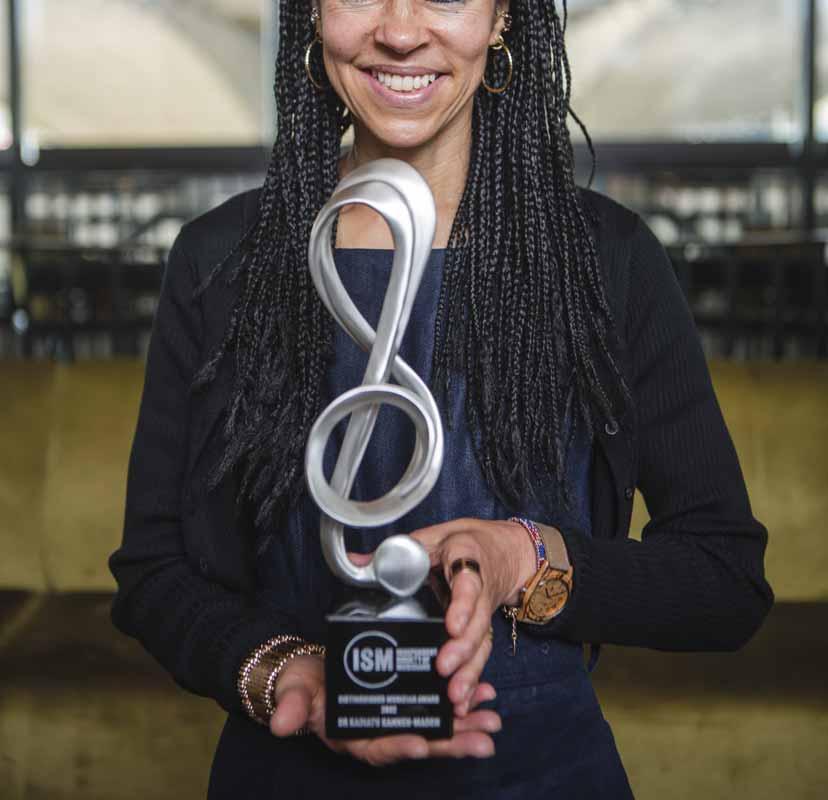
16 ISM MUSIC
Photo: Marc Gascoigne
JOURNAL
The Distinguished Musician Award (DMA) was established by the ISM in 1976 to recognise the outstanding contribution an individual has made to musical life in the UK. It is one of the highest honours within the music industry – former esteemed recipients include Nicola Benedetti CBE, Errollyn Wallen CBE, Dame Sarah Connolly, Sir David Willcocks, Sir Charles Mackerras, Sir Michael Tippett, Jacqueline du Pré OBE, Sir Charles Groves and Sir Simon Rattle CBE (who is also featured in this issue of MJ ). The award is made by the ISM Council, the governing body of the ISM, which is entirely composed of ISM members from across the UK. This year’s worthy recipient is the ‘extraordinary’ Kadiatu Kanneh-Mason.
Dr Kadiatu Kanneh-Mason lives in Nottingham and is a former lecturer in English at the University of Birmingham. Her memoir House of Music: Raising the Kanneh-Masons won the Royal Philharmonic Society’s Storytelling Award in November 2021 where it was described as ‘a fresh, moving account of raising children and nurturing their creativity. It captures what’s sincerely human in classical music-making.’ It then went on to win the Non-Fiction prize in the 2022 Indie Book Awards, noted as ‘a joyous celebration of the musical talents of the Kanneh-Mason family, which also serves as a window into .’ Kadiatu and her husband Stuart were given a Lifetime
J M Barrie Awards and in February 2022, on behalf of the family, they collected the prestigious Association of British Orchestras (ABO) Award for commitment and inspiration given to other aspiring young musicians and fellow parents.
Kanneh-Mason has seven children, all of whom are classical musicians. The family has been the subject of several TV documentaries and in early 2023, along with husband Stuart and all her children, she co-presented and
series, The Kanneh-Mason Family Takeover, for Classic FM. She is a ‘Champion’ of Music Mark, and is on the Boards of Trustees for ESTA String Teachers Association, the Nottingham Education Trust, Real Talk TV, Music Masters, the National Children’s Orchestra and MISST – the Andrew Lloyd-Webber charity for music in secondary schools. She is on the advisory council for the Royal Philharmonic Society and the family is patron to Sinfonia Viva. In April 2023 the Kanneh-Mason family were appointed Cultural Ambassadors to Antigua and Barbuda and commended for their contributions to the development of the musical talents of young Antiguans and Barbudans.
The DMA was presented to Kadiatu Kanneh-Mason
2023 at the British Film Institute, against the backdrop of the Southbank, London’s arts and music district. In her presentation speech, Black said, ‘Kadiatu is an extraordinary woman and it is a privilege to present her with the Distinguished Musician Award on behalf of the ISM board. We give very careful consideration to this award each year, and Kadiatu’s enormous impact on championing music education, support for music and raising awareness of diversity and accessibility issues in classical music made her the outstanding option. And of course, her role in bringing the wonderful music of the Kanneh-Mason family to the world is truly inspirational.
We thank and appreciate Kadiatu for all she has done so far and look forwarding to working with and learning from her in the future.’
‘I am thrilled to be chosen for the ISM’s Distinguished Musician Award. It is such an honour and I am absolutely delighted. I have always believed that music is a fundamental right for all children, and I will continue to be an advocate for inclusion in music education’
In response, Kadiatu KannehMason said, ‘I am thrilled to be chosen for the ISM’s Distinguished Musician Award. It is such an honour and I am absolutely delighted. I have always believed that music is a fundamental right for all children, and I will continue to be an advocate for inclusion in music education. For my family, music is a great source of self-expression and joy, and it is very special for me to receive this award from ISM.’
Kanneh-Mason is continuing to write and gives talks, interviews (including at the last ISM Trust online conference Where to next for music education? ) and lectures around the UK on diversity in classical music, music education, issues of race and inclusion, literature and parenting.
Kadiatu Kanneh-Mason
17 AUTUMN
Kadiatu’s enormous impact on championing music education, support for music and raising awareness of diversity and accessibility issues in classical music made her the outstanding option.
2023 ISM’S NEW DISTINGUISHED MUSICIAN
to Simon Rattle Farewell
For the second time, conductor Sir Simon Rattle is stepping down from the post of music director with an English orchestra and moving to a German one. How serious is the loss for the British classical music scene? Clare Stevens investigates

Sir Simon Rattle OM laid down his baton and said farewell to the London Symphony Orchestra (LSO)’s local audience for the last time as its music director after two concerts at the Barbican Hall on 14 and 15 June. The repeated programme featured one of his trademark works, Messiaen’s extravagant Turangalîlasymphonie, and Ces belles années … , a quirky new piece by the 96-year-old American Betsy Jolas. The 14 June concert was a joyous occasion, according to Times reviewer Richard Morrison, describing the performance of Turangalîla as ‘sizzling, adrenaline-fuelled and often spine-shudderingly loud … immaculately organised by Rattle and delivered by the LSO with the insouciant nights’, while the Jolas piece required the orchestra to stamp their feet, burst into rhythmic clapping, and roar with laughter.
orchestra did not issue a valedictory statement and is emphasising the fact that its relationship with Sir Simon will continue – he now holds the title of Conductor Emeritus for life and will be back at the Barbican in January 2024. But this month he takes up the position of Chief Conductor of the Bavarian Symphony Orchestra
and Chorus (BSO) in Munich, which will obviously be the focus of his attention. The conductor lives in Berlin, with and recently acquired German citizenship. ‘My reasons for accepting the role of Chief Conductor in Munich are entirely personal, enabling me to better manage the balance of my work and be close enough to home to be present for my children in a meaningful way,’ he said when the announcement was made that he had signed an
Previously, Rattle served as Music Director of the City of Birmingham Symphony Orchestra
Principal Conductor of the Berlin Philharmonic Orchestra for 16. The LSO must have hoped that he would stay with them for longer than the six years that he has just completed, but the combination of Brexit, COVID-19 and the
of plans to build a new, bigger concert hall with better acoustics at the Barbican seems to have persuaded him to renew his primary commitment to living and working in mainland Europe.

18 ISM MUSIC JOURNAL
Photo: Bruce Childs
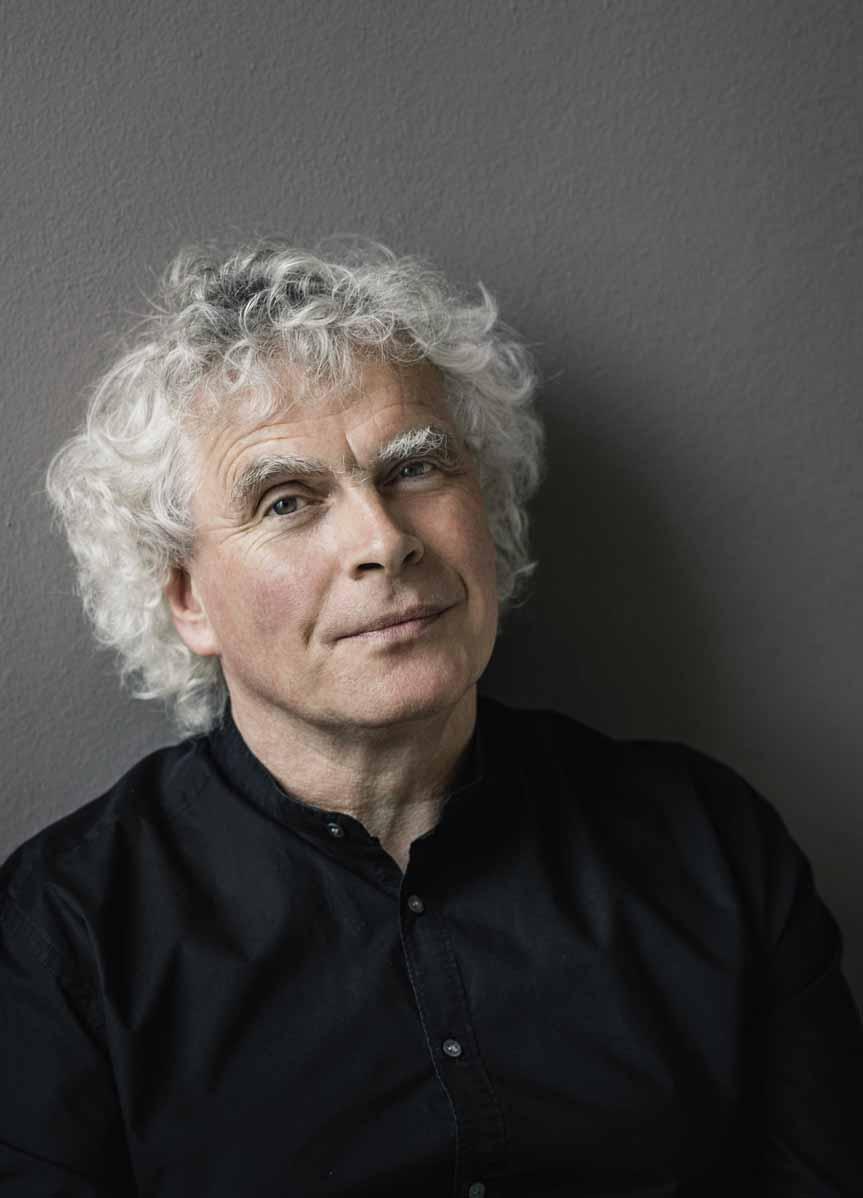
Continued overleaf > 19
…sizzling, adrenalinefuelled and often spine-shudderingly loud … immaculately organised by Rattle.
Times reviewer Richard Morrison describing the performance of Turangalîla at the Barbican Hall on 14 June 2023
Photo: Oliver Helbig
AUTUMN 2023 FAREWELL TO SIMON RATTLE
Some commentators see it as a betrayal, that he should be more loyal to the country that nurtured him. Others
leaving Birmingham; while he has given some thrilling performances with the LSO, he is too remote from the realities of life outside the capital and in particular out of touch with music education in the UK for his occasional pronouncements to have much effect.
His place at the LSO will be taken by Sir Antonio Pappano, like Rattle a product of the British state education system, and a good communicator who has made a number of television documentaries during
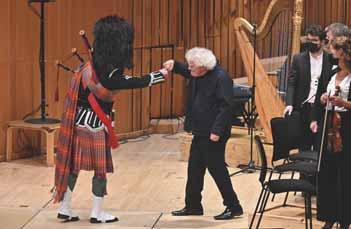
his time as Music Director of the Royal Opera House. Domingo Hindoyan has made an impressive start to his time as Chief Conductor of the Royal Liverpool Philharmonic Orchestra, as has Kazuki Yamada who
CBSO; Dinis Sousa is proving to be an effective and charismatic Principal Conductor of the Gateshead-based Royal Northern Sinfonia and Maxim Emelyanychev recently wowed the BBC Proms audience when he brought the Scottish Chamber Orchestra and Chorus to London to perform Mendelssohn’s Elijah
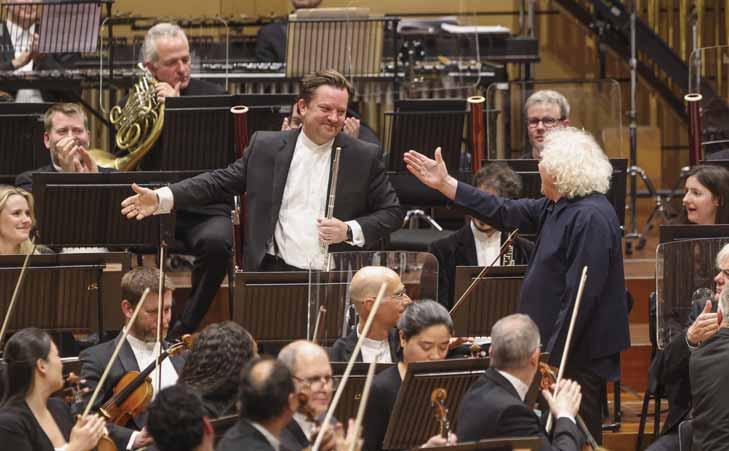
Those achievements are still having an effect, and have permanently changed, for the better, our perception of what an orchestra and a conductor and a community can do together.
20 ISM MUSIC JOURNAL
But however good these younger conductors are, they have nowhere near the public recognition that Rattle not forget his involvement with the campaign to save music education that led to the publication of the Music Manifesto in 2004 and all that grew from it. Going further back, his work with the Orchestra of the Age of Enlightenment is credited with helping period instrument performances of baroque repertoire to become the norm. In Birmingham and with the London Sinfonietta his encouragement of contemporary music was unparalleled. And it is no accident that when he wanted to show his support for the BBC Singers, threatened with closure, by inviting them to participate in an LSO concert, it happened – as reported in the last issue of Music Journal.
‘Having organised a packed meeting of parliamentarians with Sir Simon few years ago much needed stardust to the UK’s classical music scene,’ says Mark Pemberton, former chief executive of the Association of British Orchestras. ‘With his departure, we no longer have a will be listened to by politicians and the media.’
Richard Bratby, music critic and historian of the CBSO, feels that Rattle’s greatest achievements were in
period at the LSO was merely an appendix or postlude. ‘Those achievements are still having an effect, and have permanently changed, for the better, our perception of what an orchestra and a conductor and a community can do
any more (and nor should we expect him to be). He’s earned a more leisurely late-career in a less challenging musical environment.’
All images on pages 20-21: Sir Simon Rattle performing with the London Symphony Orchestra and soloists at the Barbican Centre during his tenure as the orchestra’s Music Director
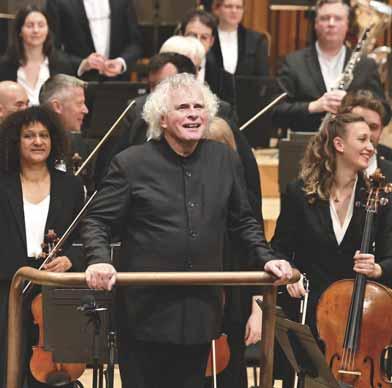
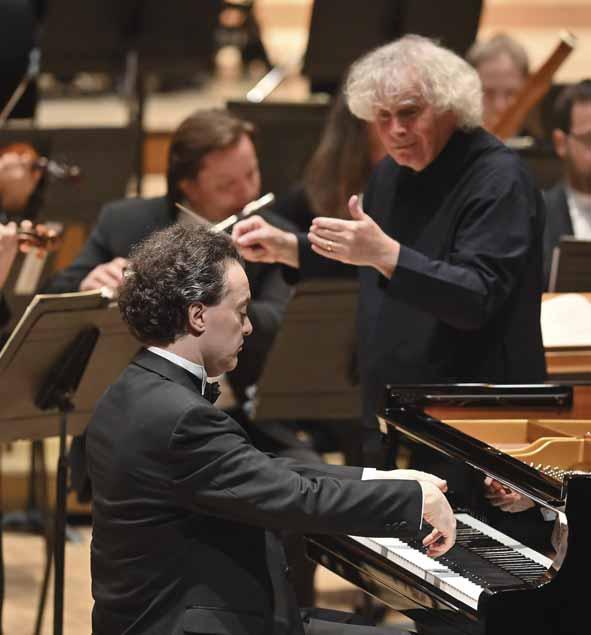
‘However good these younger conductors are, they have nowhere near the public recognition that Rattle still does,
Let’s not forget his involvement with the campaign to save music education that led to the publication of the Music Manifesto in 2004’
21
Photos: Mark Allan
AUTUMN 2023 FAREWELL TO SIMON RATTLE
Festival
festival, Scotland’s reports
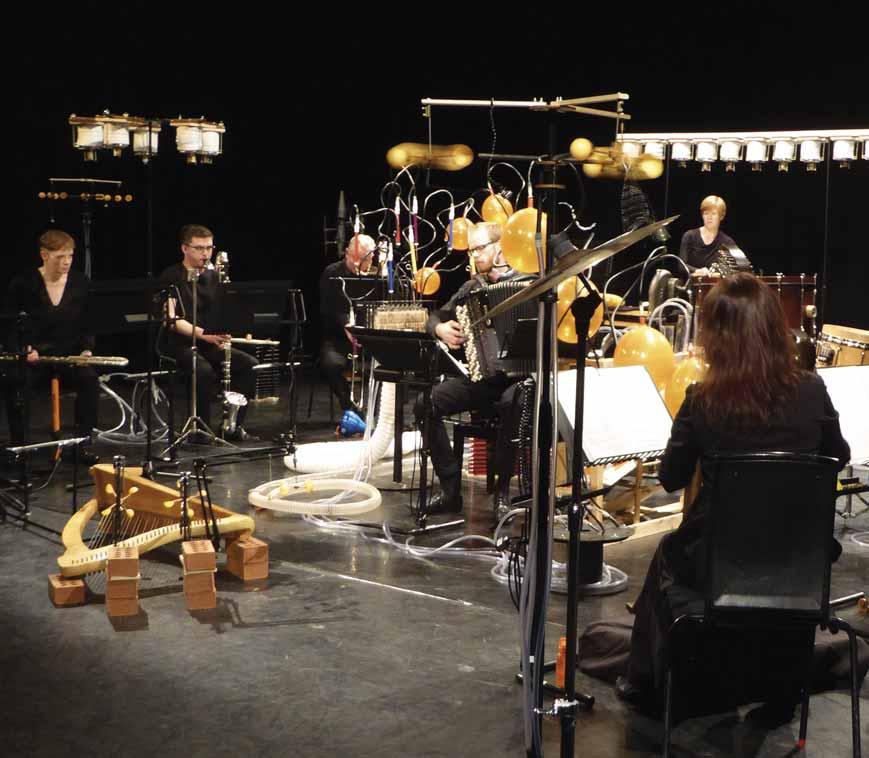
ISM MUSIC JOURNAL 22
Red Note Ensemble perform Aeolian by Maja S.K. Ratkje, Kathy Hinde and Andreas Borregaard at the 2018 festival
On a dark Saturday morning in November 2019, Aberdeen Art Gallery was full of light and colour, packed with local people keen to see how a favourite city institution had been transformed by a major redevelopment.
above, adult chamber choir Con Anima and singers from Aberdeen City Music School, Gilcomston Primary School and Big Noise Torry (Aberdeen’s Sistema Scotland instrumental tuition project), with a professional clarinettist, percussionist and pianist and two conductors gave the premiere performances of The Big Picture, commissioned for the occasion from Judith Weir CBE, then the Master of the Queen’s Music.
This highly successful performance was part of soundfestival, an annual showcase of new music for northeast Scotland, including classical, jazz, electroacoustic, and sound art. It has been running since 2005, the brainchild originally of Professor Pete Stollery of the University of Aberdeen and Mark Hope of Woodend Barn in nearby Banchory, morphing in different ways over the years.
Spaces used for performances have changed as local arts organisations have taken part in some years and
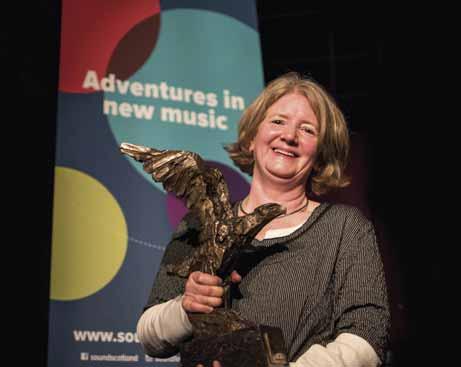

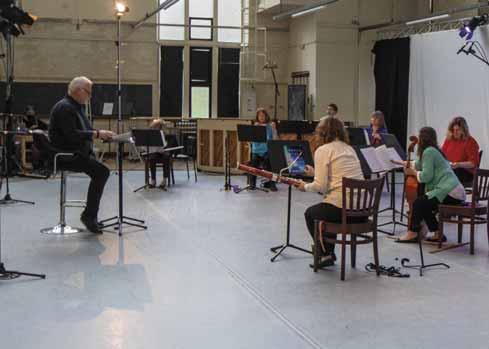

reopening are rare; performances are more likely to take place in front of smaller audiences in venues such as the city’s churches, The Lemon Tree music venue or the black box space of the university’s old Anatomy



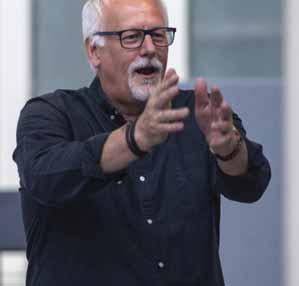
allowing the festival to focus on certain music or ideas – most recently on ‘endangered instruments’, such as the oboe and the french horn. Its parent organisation sound has become an incubator for events and workshops throughout the year as well as during the festival.
ISM’s current President, Pauline Black, has been involved with sound almost from its inception and is now on the board. ‘As a secondary school teacher she was part of the local landscape and passionate about making things happen,’ recalls Fiona Robertson, director of soundfestival. ‘She came to us saying “why aren’t you doing anything with schools?” We thought, this is exciting, somebody who is up for doing stuff with schools, especially secondary schools, that are notoriously
as during the festival’
In 2009, for example, we brought Piano Circus up, and did a six-month project on composing for multiple keyboards, in Pauline’s school and another school in Nairn, and one in the Black Isle. Now that she has moved to the university it strengthens our connections there, and she also plays in our contemporary music ensemble, Any Enemy.’
Top right and above: Pete Stollery works with Any Enemy, Aberdeenshire’s specialist new music ensemble
evelopment ma and c
Below: Soundfestival director Fiona Robertson won the Royal Philharmonic Society’s Leslie Boosey Award in 2019 for her
Continued overleaf > 23
2023
FESTIVAL
‘Its parent organisation sound has become an incubator for events and workshops throughout the year as well
AUTUMN
SOUND
COVID-19 restrictions were enforced for longer and more tightly in Scotland than in England, and Robertson pays tribute to the part Black played in kick-starting activity after the hiatus, particularly in helping to run monthly composition workshops for children of primary school age under the banner ‘Get Creative’.
‘We don’t ask for any particular standard, it’s just whoever turns



so you have to cart loads of keyboards around. They’ve done some creative music-making, they’ve created graphic scores, they did a bit of Terry Riley’s In C for fun
John Adams’s Short Ride in a Fast Machine … it’s quietly chaotic but great, and Pauline loves it. She’s always coming up with ideas, such as that we should be getting in touch with the National Youth Orchestra of Scotland because they’re doing something interesting. All her education experience and her contacts are really valuable.’
Funding cuts across the arts and education have forced sound in common with other organisations to reduce the scale of their activity, and this year’s soundfestival will run for just one long weekend, 25–30 October.
‘We’ve gone back to more of a regular festival model this year, we haven’t got
a theme in itself,’ says Robertson. She has been picking up some conversations from before the pandemic, scheduling a visit by Chamber Choir Ireland, for example, an ensemble that specialises in contemporary repertoire, often contrasted with early music, and will be bringing works by David Fennessy, Rhona Clarke and Thomas Tallis.
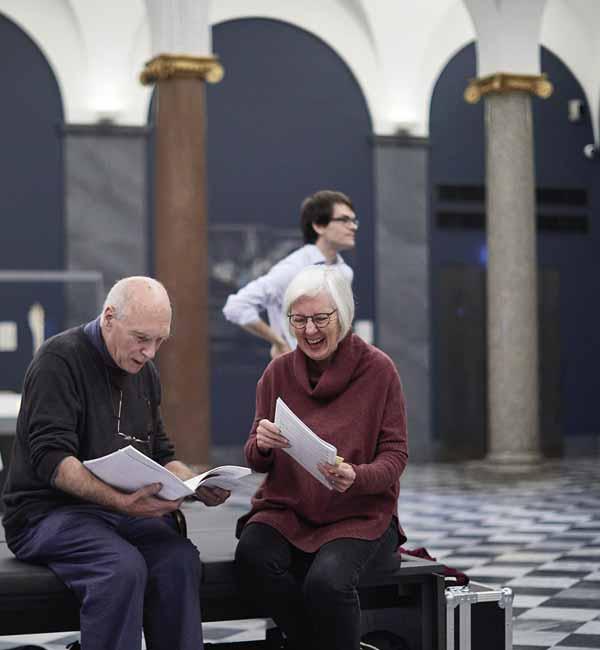
The festival has commissioned a new piece by Christopher Fox for the piano and percussion GBSR Duo; and Colin Riley’s collaborative commission Ludic Inventions will be performed by pianist Agnese Toniutti. Cellist Robin Michael and pianist Rolf
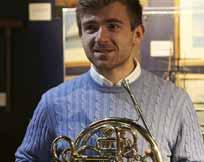
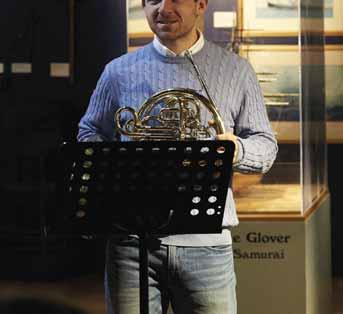
‘So instead of the ensembles travelling, the music is travelling, which is better for our carbon footprints’ Fiona Robertson, Director of soundfestival
Above left: Roger Williams with Judith Weir ahead of the world premiere of her new work, The Big Picture
Photo: Graeme Macdonald
Above right: Ben Goldscheider performs in the Maritime Museum at the 2022 Festival
24 ISM MUSIC JOURNAL
Photo: Julian Maunder
Hind will be celebrating the work of John McLeod, Lyell Cresswell and Harrison Birtwistle, while Hind will also be playing a lot of the solo pieces he streamed to great acclaim in lockdown. Sonic artist Kathy Hinde is creating an interactive work for children to be performed by north-east Scotland’s Red Note Ensemble, with several performances in response to the popularity of a similar concert last year.
While there are fewer international visitors than in the past, there is one major project called Northern Connections, a collaboration between Music Information Centres in Scotland, Norway and Finland, commissioning one composer from each country to write a new piece, which will be performed in one of the other countries. ‘So instead of the ensembles travelling, the music is travelling, which is better for our carbon footprints,’ says Robertson. ‘We are getting a work by Norwegian composer Tine Surel Lange, which will be performed by Red Note.’
More information about sound and soundfestival: sound-scotland.co.uk
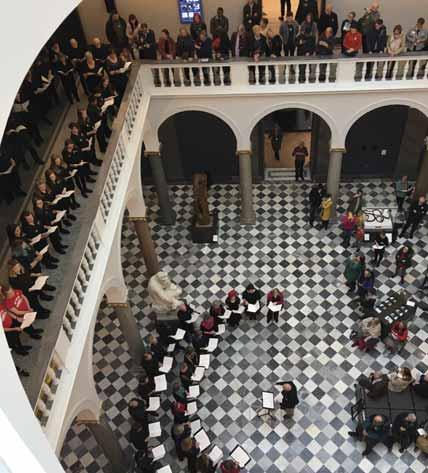
Right: Soprano Juliet Fraser performing in Aberdeen in the world premiere of Laura Bowler’s Distance, with the Talea Ensemble live-streaming from New York
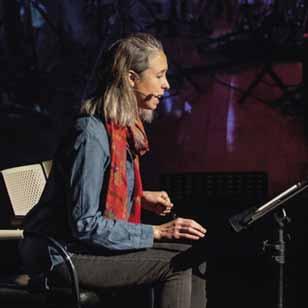
Below: Tansy Davies works with oboists in 2019 festival
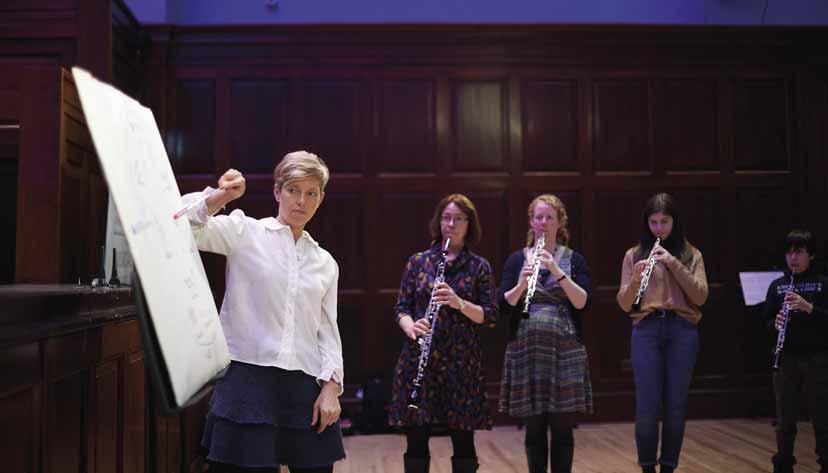
‘We’ve gone back to more of a regular festival model this year, we haven’t got a specific theme, which feels a bit like a theme in itself.
Fiona Robertson, director of soundfestival
Photo: Colin Black
Photo: Graeme MacDonald
Far right: The Big Picture in 2019
25 AUTUMN 2023
FESTIVAL
Photo: Clare Stevens
SOUND
Future directions for the ABRSM







If there’s one subject that a large proportion of the ISM’s membership is passionately interested in, it’s instrumental and vocal grade examinations. Clare Stevens puts some questions on your behalf to the Chief Executive of the ABRSM, Chris Cobb
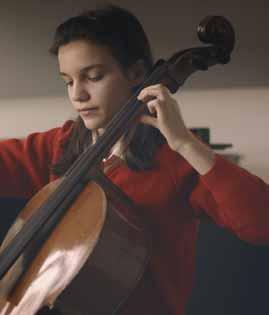





Rawarded to candidates … every aspect of the examination process matters deeply to ISM members who teach or who have children progressing through the grades. Most of the concerns expressed in recent threads on the ISM Members’ Community Facebook page would more appropriately be directed chief examiners – more about them later. The role of Chris Cobb, Chief Executive since January 2021, is essentially strategic and transformational, leading the board through the process of adapting to a changing world.
Cobb’s background is in technology. His career path before joining the board included long stints as Director of Business Systems and Services at the London School of Economics; Pro Vice-Chancellor of Roehampton University; and Pro Vice-Chancellor and Chief Operating to speak on technology matters at higher education Intelligence is going to challenge our lives in pedagogic development and assessment.
The role at ABRSM was brought to his attention by the board. They felt that Cobb would have the expertise to help complete ABRSM’s digital transformation, initiated pre-pandemic.
Cobb says, explaining that the introduction of a digital grade had to be speeded up in response to COVID-19, and in the process some shortcuts were taken, such as using a booking system for a digital grade that very much resembled the booking system for physical exams. ‘In a digital world
26 ISM MUSIC JOURNAL
Photos courtesy of ABRSM
those two things are entirely different. The natural way of managing anything digital is to have 24/7 on demand, and not to have to book a video into a time and a place.
So last year we introduced an on-demand model for the digital grade. That meant switching from an organisational perspective, around the logistics of deploying examiners, to a much more customer-focused one enabling candidates to upload exam videos whenever they like. It came with some business as well as technical work on that on-demand basis took some consultation. We went from daily to half-daily chunks of time, and now they
‘Last year we introduced an on-demand model for the digital grade. That meant switching from an organisational perspective, around the logistics of deploying examiners, to a much more customer-focused one enabling candidates to upload exam videos whenever they like’
Chris Cobb
‘My answer to that is, why not let the two models coexist?’ says Cobb. ‘There is a huge return to the physical exam
examined when they are ready. I think this is key, it’s about putting the learner at the heart of the system.’
activities such as teaching or performing. That seems to be very much appreciated. We’ve got really strong customer improvement experience, but much improved examiner experience too.’

While this system obviously works well for candidates who can’t easily get to exam centres, and was greatly appreciated during the pandemic, many ISM members still favour in-person exams.
‘It also engages students of different types, people who aren’t going through the traditional way of learning,’ he adds. ‘There are many ways of learning an instrument; they may not be learning through classical notation, they may be playing by ear, and I think that is also something that we must embrace, and not ignore.’
This leads to the topic of musical genres and broadening the range of repertoire that candidates can perform.
something I wanted to change,’ Cobb says. ‘Eighteen months ago our syllabuses were entirely classical, but the













Continued overleaf >
Chris Cobb
Our young composers’ scheme has offered nurturing and mentoring to young people from diverse backgrounds.
27
AUTUMN 2023 FUTURE DIRECTIONS FOR THE ABRSM
new syllabuses have a greater range of repertoire, and for the fourth piece in the digital grade people can play whatever they want. We’re encouraging them to think in different ways. Our young composers’ scheme has offered nurturing and mentoring to young people from diverse
the new syllabuses for piano and strings.’
The board has been working with Roger Wilson of Black Lives in Music to recruit musicians from more diverse backgrounds as examiners, and has also recruited some who are based in Singapore and Hong Kong.
The role of chief examiner has been reimagined as from the examiners’ perspective; they now have a range whether it’s about training or quality or just the logistics of tours, and across the whole working week there is always a chief examiner available.’
Asked if the board is doing enough to make exams affordable, Cobb points out that the ABRSM is the only one offering a discount for low-income families, but adds that the cost of taking an exam is a fraction of the overall cost of learning to play an instrument or studying singing or music theory. ‘We’re a charity, we don’t have shareholders, everything goes back into music education, including the other charities that we support. If we weren’t conscious of that it would have quite a large knock-on effect on that area of the music education eco-system.’
introduction of a charge for receiving printed versions, which many ISM members were vexed about when Cobb this has not been made, he says, but the ABRSM in common order to reduce its carbon footprint but also because they will be less vulnerable to fraud. ‘I can see the personal value a conscious decision, do I really need one?’
Summing up, Cobb says: ‘I want it to be recognised that the ABRSM is a very broad organisation. We have three really strong pillars, only one of which is examination and assessment. The other two are huge support for teachers, ranging from developing a revised set of diplomas to providing classroom resources like Classroom 200 to support the Model Music Curriculum; and promoting the joy of music. Every penny that is spent with us goes to support really valuable music education causes, from the training of elite musicians to grassroots engagement, not just in the UK but in 93 countries around the world.’
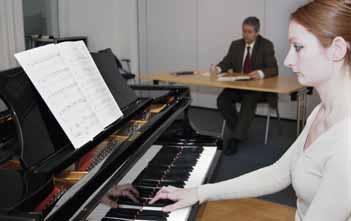
abrsm.org
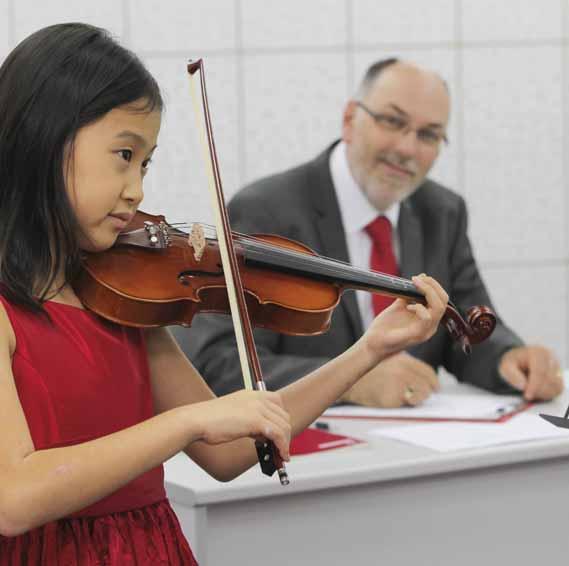
‘There are many ways of learning an instrument; they may not be learning through classical notation, they may be playing by ear, and I think that is also something that we must embrace, and not ignore’
28
Chris Cobb
50% OFF BELOWSCANFOR









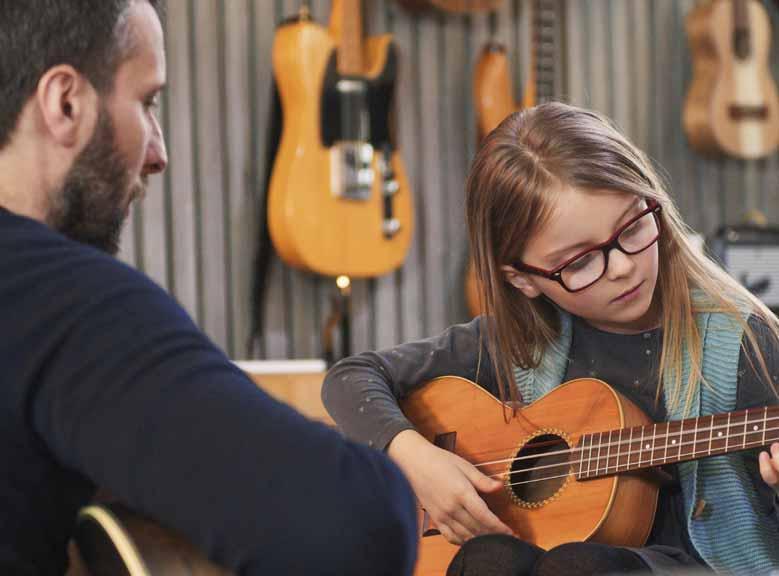
TEACHER HUB Courses | Resources | Forums abrsm.org/teacherhub JOIN
GLOBAL COMMUNITY
A
29
Norton York and the RSL Awards
By the dawn of the 1990s, musical icons such as Queen, The Cure, and U2 had paved the way for a new wave of artists that would transform the face of music… despite all the success and impact on British culture these soon-to-be iconic creators were having, there was still no formal recognition of pop music in the world of education.

of British musicians to lead a change in music education.

at the University of Westminster, York and his colleagues created Rockschool as a music curriculum that would formally award aspiring rock and pop musicians with the achieving for over a century.

As York wrote in his recent book, ‘Pop Music Education in the UK’, ‘Since 1960, British music has been a global success story but the UK’s traditional music education system

was slow to understand and react to this. That left an opportunity to create an alternative music education in Britain which embraces Pop Music in all its forms and supports young people’s desires and ambitions to perform and write it, or work within its industries.’
At the heart of York’s mission was impact. In the 90s, he envisioned the education sector celebrating creatives of various disciplines receiving the recognition that they deserved. More than 30 years on, RSL Awards has expanded upon Rockschool’s ground-breaking graded music system to support young people and their teachers across the spectrum of contemporary arts. RSL Awards now operates
100,000 candidates annually.


The success of alumni from UK pop music education courses are as diverse as Ed Sheeran, Adele and Joff Oddie (Wolf Alice), and their brilliant careers demonstrate how Britain’s modern approach to music education supports our creative industries.



Whether it’s pioneering the graded music space and professionally recorded backing tracks, releasing introduce live stream digital exams as a result of the pandemic, Norton York’s progressive approach to music education has transformed the sector, and he continues to revolutionise the creative arts with RSL Awards’ leading creative industries portfolio.
 Naomi Morris assesses the impact of the man who brought pop and commercial music into the classroom
Naomi Morris assesses the impact of the man who brought pop and commercial music into the classroom
30 ISM MUSIC JOURNAL
Left: RSL Students
As Norton says, ‘Rockschool is about bringing talented, enthusiastic musicians into the education world, so that young
Today the innovation continues with RSL’s new digital e-books, complete with AI technology powered by MatchMySound to analyse and give feedback to students performing their favourite Rockschool pieces. RSL has also teamed up with music education platform Charanga to provide learning resources to primary schools, alongside free resources with Marshall to bring an understanding of the music business into the classroom.
No matter where you might bump into Norton York, he always has one key message: music education is working. Thriving, in fact. This year, York explained that since 1994 there has been a 70% increase in the number of pupils taking school and
rising to over 72,000 in 2021.
As he writes in his report into in England: ‘Despite the well documented decline in GCSE music





is on the rise in schools. This is due in large part to the increase in vocational music
and Lulu; CEO Tim Bennett-Hart has been a commercial songwriter and record producer, scoring hits in the UK and internationally; and the company’s academic team and syllabus advisors have creative industry backgrounds. This ensures RSL’s syllabuses are modern, aligned with industry demands, and encompass the essential skills required to support aspiring creatives.
York’s drive to create inspiring teaching and learning materials is evident on RSL’s eagerly anticipated release, Rockschool Horns. Due to be published this autumn, the Rockschool Horns syllabus celebrates the horn section as a complete unit. Students learning trumpet, trombone and saxophone can play

note. From jazz standards to Motown classics, pop hits to Latin grooves, RSL
hits to Latin grooves, RSL Awards continue to foster a creative environment
for teaching and learning communities worldwide.
com/magazine/analysis/secondary/why-vocationalmusic-courses-are-popular).




Should that current trend of growth continue, companies like RSL Awards develop continue to receive recognition and funding, York may overtake traditional music GCSE and A levels by 2025 or 2026.
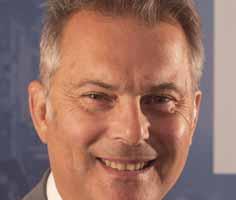
There’s an authenticity to RSL Awards’ other awarding organisations, RSL is led by creative practitioners who are actively involved in the diverse industries it caters for. Norton York has personally collaborated with artists like Billy Ocean, Dave Stewart





‘Since 1960, British music has been a global success story but the UK’s traditional music education system was slow to understand and react to this. That left an opportunity to create an alternative music education in Britain which
Norton York
Right: Norton York pictured during a recording session for the new Rockschool Horns syllabus, to be published this autumn
31
(tes. cational,
ow to and react his. create an alternative
AUTUMN 2023 MAN ON A MISSION: NORTON YORK AND THE RSL AWARDS
Music Makes Me







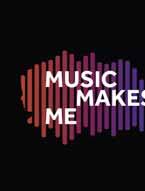

London’s Tri-borough Music Education Hub is celebrating the culmination of its Music Makes Me programme, a spectacular multi-school performance at the Royal Albert Hall which shone a light on the importance of inclusive practice and celebrating everyone for who they are. It was a co-production with the Royal College of Music, with original music by Emily Stratford and Gabriel Krchnavek. The narrative of the story charted a day in the life of a neuro-divergent young person, and it showed how music helped her emotionally regulate, socially interact, and build her independence for adulthood.
The Tri-borough Hub would like to thank everyone who helped support the project – tutors, schools, teachers, pupils, families, partner organisations, funders, musicians, composers, arrangers, copyists, production staff, the TBMH team, and many more.
triboroughmusichub.org/schoolservices/music-makes-me g/schoolme
RSL Awards launch innovative new website

The awarding organisation that brought you industry leading innovations such as digital graded music exams and the RSL Learning Platform (see our previous feature on page 30) has launched a new website for its RSL Awards.


With a complete re-design, new UX, and a fresh approach to e-commerce, all technical advancements have been built around an ethos of supporting teachers and students. You’ll also notice bespoke artwork featuring students from RSL Awards’ partners and acquaintances BIMM Institute (Birmingham), Performers Preparation Academy, and Platinum Academy of Performing Arts.
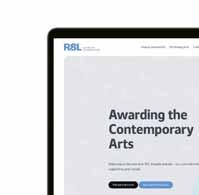
ISM MUSIC JOURNAL 32 Community @ism_music @ISMusicians @ism_music ism_music
Here’s what our members have been doing across the UK
Faber Music call on teachers to education research
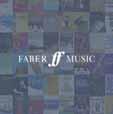
Faber Music is embarking on a research project with Sound Connections to increase their understanding of the needs of instrumental music teachers and students in the UK. As part of this, instrumental music teachers are invited to get involved by sharing their thoughts, in return for a special yearlong 20% discount on all Faber Music educational books.
Lesley Rutherford, Publishing Director at Faber Music explains: ‘In a post-COVID era, with budgets under increasing pressure and a landscape where AI and technology are changing the way we approach teaching and learning, it’s imperative that we listen to music teachers and do what we can to support them. Finding out more about the challenges they face as well as what inspires them will help us to serve their needs better.’
Philip Flood, Director of Sound Connections adds: ‘Through this research, we aim to identify important trends and changes within the music education landscape, as well as new and interesting innovations that could inform the future direction of music teaching and learning. We hope that instrumental music teachers across the UK will join the dialogue during this project, get involved and have their say.’
Complete the Peripatetic and Private Music Teachers Survey at surveymonkey.co.uk/r/HVZZDS5

Annie Lennox announced as Patron of Dalcroze UK



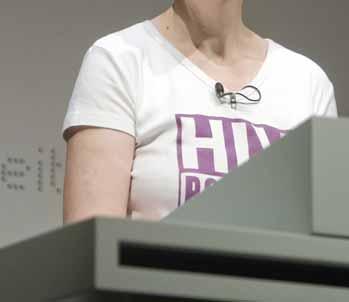
One of the most universally renowned artists in pop musical history, Annie Lennox, has agreed to lend her name to the charity Dalcroze UK.
It was at the Primary Department of Aberdeen High School
dance teacher, and encountered the pioneering method of experiencing music through movement developed by the Swiss composer, musician and music educator, Émile Jaques-Dalcroze. Later, training as a classical musician, she was immersed in the Dalcroze Spring Course of 1974. Lennox formed the band
For further information about Dalcroze UK contact: Christine Wardle, development@dalcroze.org.uk , dalcroze.org.uk
Anthony Adkins, pianist and long-standing member of the ISM, was made Medallist of the Order of the British Empire (BEM) by HM King
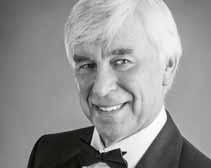
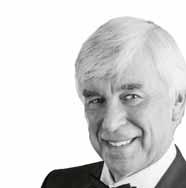
to much critical acclaim throughout the world. Through some of his concerts he has given many thousands of pounds to more than 20 charities, and he has continued to do this, even since the diagnosis of a benign brain tumour in 2021, which has left him virtually deaf in one ear. Amazingly, Anthony writes that this loss has made him considerably more sensitive to sound than before. Now, 50 years since his London debut at the Wigmore Hall, he is still very much in demand for performances in this country and abroad as well as for teaching.
ounds to more than 20 ven since 021, s




 BEM ARCM FISM
BEM ARCM FISM
33 AUTUMN 2023 ISM COMMUNITY
Photo: Britt Berger

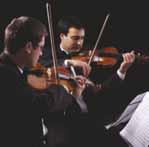

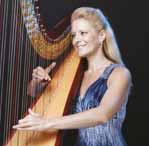


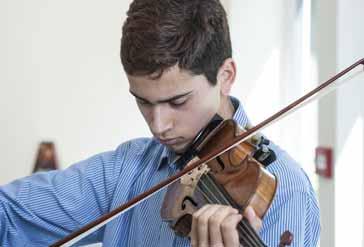
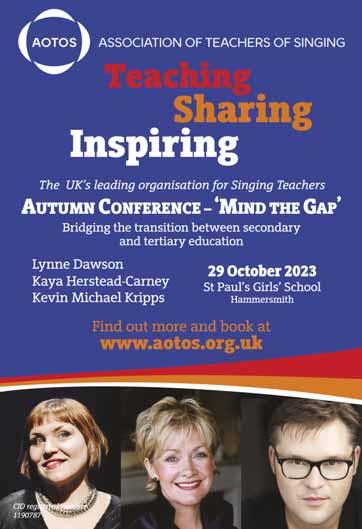
34 Visit our website www.hencilla.co.uk or email mail@hencilla.co.uk Hencilla Canworth G I Ltd is Authorised and Regulated by the Financial Conduct Authority Benslow Music Instrument Loan Scheme, Aston Building, Benslow Lane, Hitchin, Herts, SG4 9RB Registered Charity No. 313755 @BenslowMusicILS @BenslowMusicInstrumentLoanScheme @benslowmusicils www.benslowmusic-ils.org Benslow Music Instrument Loan Scheme is an inclusive and unique UK charity, offering talented young musicians affordable access to high-quality instruments. We have over 800 instruments in our care, ranging from high quality strings to woodwind and brass, available to UK applicants aged 7-25 years in full-time education. TAKE YOUR MUSICIANSHIP TO THE NEXT LEVEL
Photo: Bill Hiskett 2014
Piano from 2023
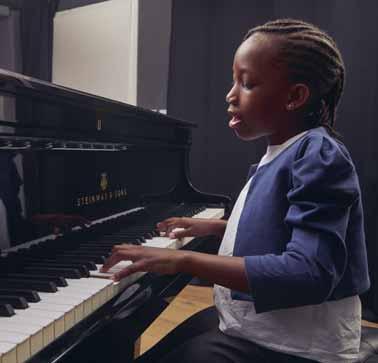
Your performance. Your choice.
The most diverse selection of styles and genres yet, including Western classical, pop, jazz and Latin, music from stage, film & video games, and more. Available in print or as digital books with performance notes and downloadable audio available.

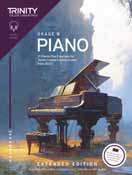
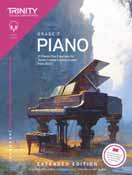
trinitycollege.com/piano-books
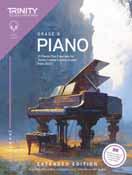
Member spotlight
Deirdre Ward, violinist

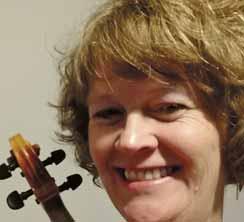
1. How did you originally get into music?





Lancashire Music Service was my door into the music profession. They had a fabulous set-up for supporting young musicians in the 1970s and Andrew Collier. All my lessons prior to the Royal Academy of Music were paid for on a county scholarship. Without that support I would not
2. What or who inspires you?
Growing up by the sea, with Lake District views across Morecambe Bay, my tonic has always been to get out in nature. That’s what
3.What piece of advice has helped you the most in your career?
Something that’s taken a lifetime to embrace is the advice to accept you’re on your own unique path, so
4.What has been the most rewarding project so far in your career and why?




There were actually three ‘most rewarding’ experiences in my life.
with Houston Grand Opera and a Romanian conductor from the Metropolitan Opera in New York. I’d wake up in
the morning and think ‘Yay, we get to play it today!’ Unlike so much orchestral playing I’ve experienced, this conductor demanded the utmost expression from everyone. Performing Haydn, Mozart and Beethoven quartets on gut strings was another liberating experience. And the third highlight was performing the Bach Cantatas with the Monteverdi Choir and English Baroque Soloists in the year 2000.
5. What advice would you give to someone wanting to succeed in the music industry?
Study your art well, but equally
6. If you could work in another industry, what would it be?
I was always a sporty child and sorely missed having to give up sport for music. So I think some career in the outdoors would have suited me, though I think law might have been a strong contender; I was hooked on The Paper Chase
7. If you could change one thing about the music sector, what would it be and why?
I’d love to eliminate the element of measurement and competition from the music sector. I think I’d have enjoyed my career as a musician so much more without these negative drivers.
8. What are your future plans?
I’ve just retired after over 30 years of teaching in music academies, colleges and schools. I look forward to simply helping my private students get as much pleasure and satisfaction from their violin playing
9. Finally, what does your ISM membership mean to you?


I think the main advantage to the ISM membership for me is knowing who to call if there’s a problem, and the insurance coverage for teaching violinguru.co.uk

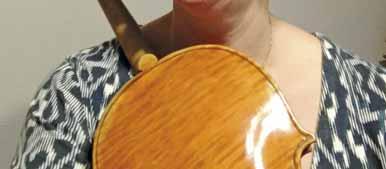
ism.org @ISM_music @ismusicians @ism_music ISM_music








































































































































































 Naomi Morris assesses the impact of the man who brought pop and commercial music into the classroom
Naomi Morris assesses the impact of the man who brought pop and commercial music into the classroom













































